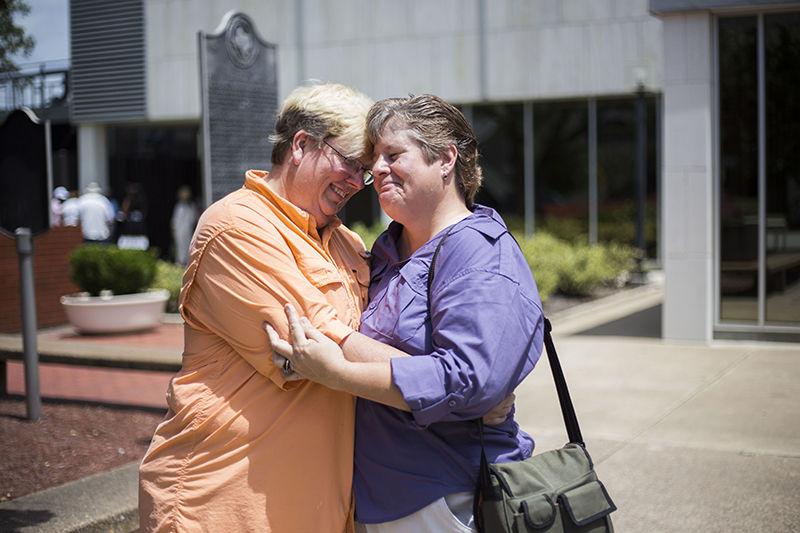On Friday, June 26, the Supreme Court of the United States determined same-sex marriage to be a constitutional right in the case of Obergefell v. Hodges, effectively legalizing same-sex marriage throughout the country.
The 5-4 decision came after decades of political controversy and legal battles on the subject. Before the court decision, gay marriage was banned in 13 states. The ruling in Obergefell v. Hodges, however, forbids states from denying its citizens the right to same-sex marriage.
Immediately following the ruling, several counties in Texas — including Dallas, Harris, Travis and Bexar — began issuing marriage licenses to same-sex couples, while Brazos County and several others refused, citing an issue with the forms — applicants were only referred to on the form as “male” or “female.”
Recent newlyweds Teresa and Dru Denae, one of the first same-sex couples to be married in Brazos county, experienced the confusion firsthand. They received their marriage license at the Brazos County courthouse on Monday after having been denied Friday.
“We came up Friday once we heard the Supreme Court decision to allow same-sex marriages,” Dru Denae said. “We came up here to get a marriage license, and we were told that the county attorney for Brazos County had instructed the county clerk not to issue any licenses at the time. So we left — we left disappointed, but hopeful.”
However, Brazos County clerk Karen McQueen said the state corrected the form and put it on the website Friday evening, and the couple returned Monday as soon as they heard the clerks were issuing licenses.
“We came down as quick as we could,” Dru Denae said. “Luckily the Brazos County clerks are wonderful. They were very polite the entire time even when they said ‘no.’ They did not want to say ‘no.’”
Davis Land, telecommunication and media studies sophomore and LGBT rights advocate, said the SCOTUS ruling is a beginning step in the liberation movement for the LGBT community.
“We still must fight for non-discriminatory laws, recognition of non-binary genders, the protection of trans folk from state and non-state violence, and more beyond that,” Land said.
The court’s opinion remains under significant criticism by public figures in Texas, where gay marriage was not recognized prior to June 26.
In a statement, Gov. Greg Abbott said, “I expect all agencies under my direction to prioritize compliance with the First Amendment to the United States Constitution, Article I of the Texas Constitution, and the Texas Religious Freedom Restoration Act.”
In a statement, Texas Attorney General Ken Paxton said, “County clerks and their employees retain religious freedoms that may allow accommodation of their religious objections to issuing same-sex marriage licenses.”
In response to other same-sex couples who may be refused marriage licenses, Dru Denae said, “Hold on. The U.S. Supreme Court has spoken. They can fight it all they want, but in the end you will prevail.”
A&M political science professor Jon Bond, Ph.D., said if a same-sex couple feels that the state is denying them their constitutional rights, the remedy is to go to court.
“Are the actions they are advocating legal?” Bond said. “That’s something that the Federal courts will have to determine if and when a resident of Texas challenges them.”
McQueen said she won’t force Brazos County employees to go against their religious beliefs.
“If it’s against their religious beliefs and they do not feel comfortable then I won’t force them, but we’ve got enough employees here so it won’t be an issue,” McQueen said.










